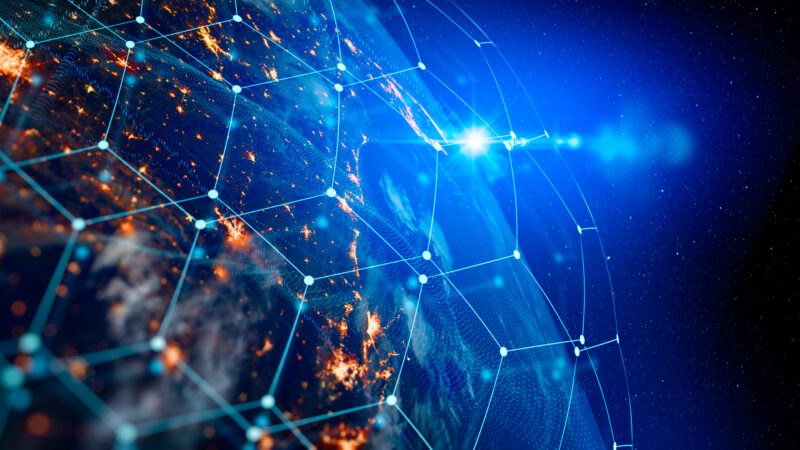Abstract: Emerging advancements in Artificial Intelligence (AI) systems profoundly affect multiple facets of human existence. AI encompasses sophisticated technologies that can perform tasks traditionally requiring human intelligence. The research delves into possible disruptions AI can cause on the geopolitical and international relations front as it fundamentally reshapes diplomacy, military operations, economic cooperation, trade, foreign policy formulation, and data sharing.
Problem statement: What are the prospects of Artificial Intelligence in the power competition between global superpowers?
So what?: Countries need to invest more in AI research and development to secure themselves from the challenges that lie ahead. There is a need for an inclusive and collaborative global AI strategy for the future, considering the disruptions AI will likely bring forth in the global geopolitical order. Given the world’s lack of ethical, legal, and institutional preparedness to effectively address the proliferation of AI across various domains, it is imperative for international multilateral convergence to swiftly formulate shared guidelines. This collaborative effort aims to regulate AI and harness its potential as a common public good, contributing to the advancement of humanity as a whole.

Source: shutterstock.com/green butterfly
The Age of AI
Emerging Artificial Intelligence systems and their increasingly pervasive impact on every aspect of human life is one of the most prominent discourses of our times. ‘Artificial Intelligence’ is an umbrella term for complex technologies capable of performing tasks that typically require human intelligence, including machine learning, natural language processing, deep learning, intelligent robotics, biometrics, and semantic technology. AI systems are only likely to grow exponentially and develop capabilities resembling the precision of human intelligence. The implications of such developments on different aspects of life are yet to be explored and understood, prompting certain scholars to predict an ‘AI revolution’ in the near future.
AI systems are only likely to grow exponentially and develop capabilities resembling the precision of human intelligence.
The realm of geopolitics and international relations will be affected by the rapid progress in the field of AI, as huge strides in sophisticated technology will fundamentally transform diplomacy; military strategy; economic cooperation and trade; and data sharing. A significant number of countries in the world have developed AI strategies and policies,[1] including the #AIforAll policy, which is India’s national strategy for AI, the U.S. AI initiative, China’s Next Generation Artificial Intelligence Development Plan, France’s national strategy named AI For Humanity, Pan-Canadian AI Strategy, and many more. The adoption of such strategies by prominent countries exemplifies the importance that AI disruptions are likely to bring forth in the global geopolitical. Therefore, many nations are investing more in AI research and development to secure themselves from the challenges ahead. Russian President Vladimir Putin’s statement that “ whoever becomes the leader in this sphere [AI] will become the ruler of the world” mirrors the strategic realisations other countries have arrived at regarding AI. The adoption of AI in militaries and national defence strategies has distinct implications on the nature of warfare as it can improve the speed and accuracy of military decision-making, planning, and logistics.[2]
An AI Arms Race?
The global race for AI supremacy, especially between China and the United States, is reminiscent of the arms race between the US and the Soviet Union during the Cold War. The geopolitics of the 21st century is characterised by the rise of China and the challenges it poses for U.S. supremacy within the global order. A statement in a report released by the U.S. National Security Commission on AI states that – “We are in a competition with China and AI is at the absolute centre of that competition” – is a clear testimonial to the centrality of AI in the power competition between the two global superpowers.[3] China’s AI strategy of the “Next-Generation Artificial Intelligence Plan” aims to make China the “Premier AI Innovation Center” by 2030, one of the top priorities of the Communist Party Leadership. However, the U.S. still remains the global leader in terms of AI, although by a very short margin (as most indicators point out that the U.S. is ahead of China)[4] due to the existence of major tech companies and related talent pools in the AI field, including private corporations like Google, Amazon and Facebook. The U.S. is also ahead of China in the crucial field of manufacture of AI and semiconductor chips, which are crucial elements in various electronic devices and also in military and defence equipment and often determine the competitive edge countries have in these areas. The U.S. has adopted a steadfast approach in countering China in AI. It is asserting its dominance by imposing sweeping restrictions on China’s ability to both purchase and manufacture certain high-end chips used in military applications, including advanced computing chips, the ability to develop and maintain supercomputers, and the manufacture of advanced semiconductors, as part of efforts to protect ‘U.S. national security and foreign policy interests’.[5]
The latest strategic move in the gameplan of the U.S. to block China’s advance in the field of AI was a recent deal between the U.S., Japan, and the Netherlands, restricting the export of advanced chipmaking machinery to China, thereby hindering China’s ability to develop domestic chip capabilities.[6] The U.S. is making concerted efforts to hinder China’s capacity for advancing semiconductor technology from its early stages by obstructing China’s access to advanced equipment, given that China heavily relies on the import of such state-of-the-art machinery.
The latest strategic move in the gameplan of the U.S. to block China’s advance in the field of AI was a recent deal between the U.S., Japan, and the Netherlands, restricting the export of advanced chipmaking machinery to China, thereby hindering China’s ability to develop domestic chip capabilities.
This intense strategic competition should be seen in the context that a nation with access to the latest cutting-edge technology in AI is likely to have a distinct military/defence advantage, as AI has the potential to fundamentally transform the nature of warfare. The Chinese military aspires to surpass the U.S. by leveraging AI and pursuing “military intelligentization” by operationalising AI and enabling related technologies to gain a competitive technological advantage on the battlefield.[7]
The implication of the geopolitical race for AI dominance on global order remains to be seen. Will the U.S. be able to retain its AI supremacy in the face of stiff competition with China? Moreover, will the U.S. policy of restricting the export of critical equipment to China backfire in the form of China developing its own indigenous technology to develop equipment?
Deepening Disparities in Global Order
The rapid and widespread emergence of Artificial Intelligence is likely to widen the existing inequalities in world order by deepening the divide between the global north and global south. Developed nations in the global north are better prepared for the AI revolution as they have invested significant amounts towards research and development of AI systems. In a report recently published by the World Economic Forum, it has been highlighted that countries in the global south are facing significant challenges in their pursuit of advanced AI technologies. One key factor contributing to this gap is structural limitations, including the absence of robust infrastructure components. These crucial components encompass high-capacity computing resources, efficient network infrastructure, and mature cybersecurity infrastructure, all of which come with substantial financial burdens that many global south nations struggle to prioritise amidst their pressing developmental concerns.[8] The resultant ‘AI divide’ has prompted suspicions of a new form of colonialism emerging due to the deepening inequality between countries.[9]
India in the Global AI Race
India’s commendable programme of ‘AI for All’ which is the guiding slogan of the National Strategy of Artificial Intelligence released by NITI Aayog, aims at making AI affordable and accessible to all,[10] through the identification of applications with maximum social impact and strive to evolve adaptable solutions for emerging economies. Therefore, India’s AI strategy has notably taken a distinct direction from the global AI race by carving out a niche through a strategy focusing on social inclusivity and empowerment by operationalising RAI (Responsible AI) principles.[11] India is home to an enviable digital stack,[12] which includes biometric and financial services such as Aadhar, DigiLocker, UPI, The CoWIN platform and has, therefore, proved its potential to dispense advanced technology on a mass level for public use. As the chair of both G20 and the Global Partnership on Artificial Intelligence (GPAI), India can play a crucial international role in setting the agenda of the global discourse on AI and being the voice of the global south by pushing for an inclusive and collaborative global AI strategy for the future.
As the chair of both G20 and the Global Partnership on AI, India can play a crucial international role in setting the agenda of the global discourse on AI and being the voice of the global south by pushing for an inclusive and collaborative global AI strategy for the future.
The vast opportunities an AI revolution promises are not without its challenges. The world remains underprepared ethically, legally and institutionally to deal with an unprecedented rise of AI across spheres. Therefore, there is an urgent need for international multilateral convergence to develop common guidelines to regulate AI and develop it as a common public good for the progress of humanity as a whole.
Nikhitha Nelson is a final year Political Science honours student at Lady Shriram College for Women, University of Delhi. Her research interests include feminist international relations, comparative politics and human rights. The views contained in this article are the author’s alone.
[1] “Global AI Strategy: How Different Countries are Pursuing AI?,” 2022, Analytics Insight, https://www.analyticsinsight.net/global-ai-strategy-how-different-countries-are-pursuing-ai/.
[2] Daniel King, Centre For International Governance Innovation, “The Impact of Artificial Intelligence on Military Defence and Security,” https://www.cigionline.org/static/documents/no.263.pdf.
[3] The National Security Commission on Artificial Intelligence, “The Final Report,” https://www.nscai.gov/2021-final-report/.
[4] Jane Zhang, Jesse Levine, Loren Grush and Spencer Soper, “What Is The State of US-China Competition in AI?,” Bloomberg.com, https://www.bloomberg.com/news/articles/2023-06-29/what-is-the-state-of-us-china-competition-in-ai#xj4y7vzkg.
[5] “FOR IMMEDIATE RELEASE BUREAU OF INDUSTRY AND SECURITY,” October 07, 2022, Office of Congressional and Public Affairs.,BIS.doc.gov, https://www.bis.doc.gov/index.php/documents/about-bis/newsroom/press-releases/3158-2022-10-07-bis-press-release-advanced-computing-and-semiconductor-manufacturing-controls-final/file.
[6] Cagan Koc and Jenny Leonard, “Biden Wins Deal With Netherlands, Japan on China Chip Export Limit,” Bloomberg.com, https://www.bloomberg.com/news/articles/2023-01-27/biden-wins-deal-with-dutch-japan-on-china-chip-export-controls?srnd=premium-europe&leadSource=uverify%20wall.
[7] Elsa B. Kania, “Chinese Military Innovation in Artificial Intelligence | Center for a New American Security (en-US),” CNAS, https://www.cnas.org/publications/congressional-testimony/chinese-military-innovation-in-artificial-intelligence.
[8] “The ‘AI divide’ between the Global North and Global South,” The World Economic Forum, https://www.weforum.org/agenda/2023/01/davos23-ai-divide-global-north-global-south/.
[9] Karen Hao, “Artificial intelligence is creating a new colonial world order,” MIT Technology Review, https://www.technologyreview.com/2022/04/19/1049592/artificial-intelligence-colonialism/.
[10] Kevin Kelley, “National Strategy for Artificial Intelligence,” | NITI Aayog, https://niti.gov.in/sites/default/files/2019-01/NationalStrategy-for-AI-Discussion-Paper.pdf.
[11] “RESPONSIBLE AI #AIForAll,” 2022, | NITI Aayog, https://www.niti.gov.in/sites/default/files/2022-11/Ai_for_All_2022_02112022_0.pdf.
[12] India Stack, https://indiastack.org/.






